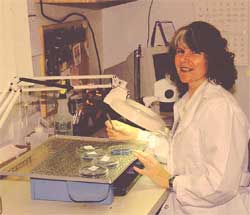|
 Who will be
testing seed in commercial and government seed laboratories in
the future? Who will be
testing seed in commercial and government seed laboratories in
the future?
In the last
several months there has been considerable discussion in the
industry about whether there are enough Registered Seed
Technologists (RST's) and Certified Seed Analysts
(CSA's) to fill the industry needs. If not, where can more be
trained, and how can we encourage more people to enter the
profession.
This article
will deal with RST's and CSA's and our discussion will be
limited to those people trained for purity and viability
testing. Colorado State
University in co-operation with the
Society of Commercial
Seed Technologists, the Association of Official Analysts,
SeedQuest, the
American Seed Trade Association
along with the industry have expressed interest in learning if
there is a need for University level training of Seed Analysts
and Technologists.
 To
begin with let's review the history and background. The number
of seed analysts in this country comprises just over 300 RST's
and CSA's combined. Since it is not a profession with a large
number of people, the training facilities and opportunities have
always been rather limited. There used to be seed technology
training at such schools as Mississippi State, Oregon State,
Montana State, Michigan State universities. Those programs have
all but disappeared. The last complete training opportunity was
at the former Larimer County VoTech (now the Front Range
Community College) in Fort Collins, CO which was offered from
1983 to 1993. It was conducted with personnel and support from
Colorado State University (CSU), the National Seed Storage as
well as the Larimer County VoTech center. This program graduated
approximately 10 trained seed analysts per year who went on to
get internships, RST and CSA certificates and eventually found
positions in seed laboratories around the country. To
begin with let's review the history and background. The number
of seed analysts in this country comprises just over 300 RST's
and CSA's combined. Since it is not a profession with a large
number of people, the training facilities and opportunities have
always been rather limited. There used to be seed technology
training at such schools as Mississippi State, Oregon State,
Montana State, Michigan State universities. Those programs have
all but disappeared. The last complete training opportunity was
at the former Larimer County VoTech (now the Front Range
Community College) in Fort Collins, CO which was offered from
1983 to 1993. It was conducted with personnel and support from
Colorado State University (CSU), the National Seed Storage as
well as the Larimer County VoTech center. This program graduated
approximately 10 trained seed analysts per year who went on to
get internships, RST and CSA certificates and eventually found
positions in seed laboratories around the country.
Now, the main source for training exists as
on-the-job training in commercial and state laboratories. In
these labs, people interested in becoming an RST or CSA are
trained in the specific needs of the lab, and they often have to
work with RSTs or CSA's in other labs to get sufficient training
and experience to pass the rigorous tests given by the
Association of Official Seed Analysts (AOSA) and the Society for
Commercial Seed Technologists (SCST). These tests are given once
a year, and it often takes several years of training before
someone is qualified to take the tests.
Colorado State University offers four basic
courses in Seed Technology and two Summer Workshops in Purity
and Viability for hands on experience. There are also various
other workshops given by other labs, universities and companies.
But, none of these have led to more RST's or CSA's coming into
the trade. These courses and workshops have primarily increased
the knowledge of the existing analysts.
It has been expressed that some commercial labs
have been unable to find RST's and others have had to “make do”
with one RST manager. However, the last official surveys were
run many years ago by Dr. Louis Bass at the National Seed
Storage Lab. He also played the role of “employment liaison”
that helped analysts and labs with positions available to find
each other. Now, no one officially plays that role. Therefore,
one goal of this article is to present a survey that will
determine the need for additional analysts in the industry. We
would like to hear from you, the reader, and the laboratories
around the country with your opinions and evaluation of the
present situation. The information obtained from the attached
survey will be published by the co-operating organizations
listed at the beginning of this article.
These organizations are asking all members of the
seed industry to please fill out the
following short survey and send it electronically or
by fax to:
Carissa Show
Dept. of Soil and Crop Sciences
Colorado State University
Ft. Collins, CO 80523
Carissa.Schow@colostate.edu
Fax:
970-491-0564
|